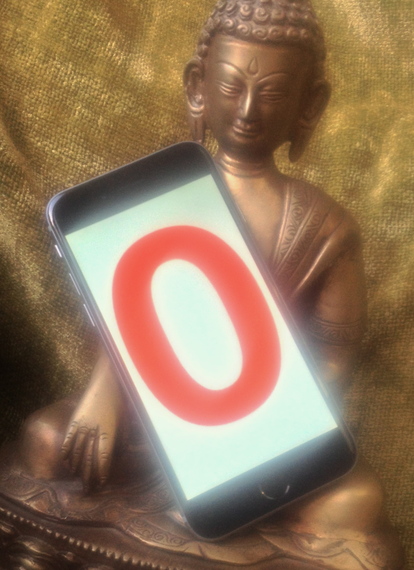
I like spiffy new gadgets as much as the next guy. True, I didn't stand in the long line in front of my local Apple Store on Day 1 of the iPhone 6 release, but only because I was sitting at home, cleverly reserving mine online so I could come back on Day 2 and be whisked to the front of the line.
But of course, the problem with these ultra-sleek gizmos (as I'm about the 700 millionth person to point out) is that they're windows to endless distraction. For years I've enjoyed walking late at night, looking up at the stars and hearing the crickets, or just feeling the world exhale and get quiet. The few people I see are usually walking dogs. These days, most of them walk with their heads bent at that telltale 45-degree angle, their faces bathed in the soft blue-gray glow of their little screens, oblivious to the night air and the silence. (The dogs, who happily lack the opposable thumbs necessary to operate electronic devices, enjoy the excursion as they always have... unhypnotized.)
When I'm at a restaurant and there's a couple sitting nearby, if one of them gets up to go to the bathroom I can count the seconds till the other whips out a phone to check messages. Or they don't even wait until the other leaves. By now, we've all seen, and maybe sat at, tables full of people eating "together," each one in a separate phone world. But my intention here is not to go off on a young-folks-today rant: "Why, when I was your age, I trudged two miles through the snow to talk to Cousin Milly with a Dixie cup and a piece of string," blah blah blah. Boring.
I teach
natural meditation, which has two important aspects. One is that, rather than try to force the mind to focus or concentrate, we allow it to settle on its own, like water flowing downhill. The other is that we deal with our actual lives as we actually live them. Our foibles and our stumbling blocks, rather than obstacles to meditative practice, are used as
opportunities for practice. For example, in my work with prisoners, a student will sometimes stop showing up for our sessions for a few weeks or months because he's in "administrative segregation": solitary confinement. When he reappears, he usually says something like, "Ad-seg was a challenge at first, but then I realized I could go crazy or turn it into a meditation retreat, courtesy of the state. It was good to have that choice."
So, in the case of our more or less obsessive-compulsive relationship with the handy, pocket-sized Apple (or Android) Distract-O-Matic: How can we flip this addiction around and turn it into a meditative practice?
Actually, it's simple:
The next time you're in one of those involuntary nothing-happening moments -- your date goes off to the bathroom, you're stuck at a red light, you're waiting for an elevator -- and you find yourself automatically reaching for your phone...
just don't do it. Yes, yes, I understand how unhelpful that sounds, but hang on: Here comes the subtle, skillful part. When you refrain from grabbing your phone, you're going to feel a wave of squirmy anxiety. If there were an app that translated vague feelings into words (and there probably will be soon), it would read out as something like:
But, but... I might be missing something. Maybe something important, or interesting, or fun, or... something! Feed me some news, stimulate me with input, give me anything, as long as I don't have to sit here and deal with nothing, because that's unbearable.Feeling that wave of anxiety is fine. In fact, it's what's going to make this meditation work.
The key is to let the wave happen. Don't try to ignore the feeling. Don't try to suppress it. Don't try to turn it into something else. Instead, experience what that feeling actually
is. We call them "feelings" because they feel a certain way: They're subtle, internal physical sensations, maybe in the chest or abdomen or head. Allow yourself to feel that wave of feeling, and watch it pass through you in its own time, like a wave passing through the ocean. Just don't
ride the wave. Don't be caught up in it, driven by it, compelled to do something... like whip out your phone.
Then a small miracle happens. The wave does indeed pass, and you're still there. You didn't follow the compulsion, and guess what: your head didn't explode after all. This is called freedom, and this little taste of freedom has exactly the same flavor as the big freedom that goes by fancy names like nirvana, satori, or samadhi. It's the nothing we've been trying to avoid, but it turns out to be a
delicious nothing. It can't really be described, but let's just say this: it's kind of like taking off a pair of pants that's too tight. Ahhhhhhh!
You can use the same approach with other kinds of compulsions. When you find yourself getting caught up in the urge to light a cigarette or make a cutting remark that's going to hurt someone you care about, just don't do it. Then allow yourself time to feel that wave of fidgety anxiety, notice what it feels like in the body, let it be there for as long as it needs to, and then let it pass. Don't try to push it away, but don't buy into it. Maybe five minutes later you'll light the cigarette anyway, but even if you buy yourself five minutes of freedom you've accomplished something.
If you keep practicing like this, with the cigarettes or the phone or whatever else has been pushing you around, the little patches of freedom start to connect up. More and more, you find yourself living in liberative, wide-open space. You start to see that delicious nothingness underlies all moments, even when you're busy with everything. It's
all ahhhhhhh.
We could call this meditating with the iPhone 0. Unlike the iPhone 6 (which I'm enjoying just fine, thank you very much), it doesn't eventually grow stale as we seek our next source of distraction. Liberation never goes out of style. Right now the good folks in Cupertino are presumably test-driving the iPhone 7, designed to take the new-car smell off the 6, and one day the iPhone 17 will make the 7 seem as primitive as a lump of coal in your pocket. But the iPhone 0 is timeless: It will be just as fresh when space colonists use it on the planets of distant galaxies as it was when the ancient yogis used it in the jungles of India.
Enjoy your freedom.
from Healthy Living - The Huffington Post http://www.huffingtonpost.com/dean-sluyter/meditating-with-the-iphon_b_5900972.html?utm_hp_ref=healthy-living&ir=Healthy+Living
via
IFTTT